Story by Hope Goldman. Photos by Nancy McGuire. Video by Lawson Martin.
Break Bread, Break Borders is a catering company serving up gourmet food from around the world in the Dallas-Fort Worth area, but at the core it is a beacon of empowerment for an ever-growing portion of the DFW population—refugee and immigrant women with a dream.
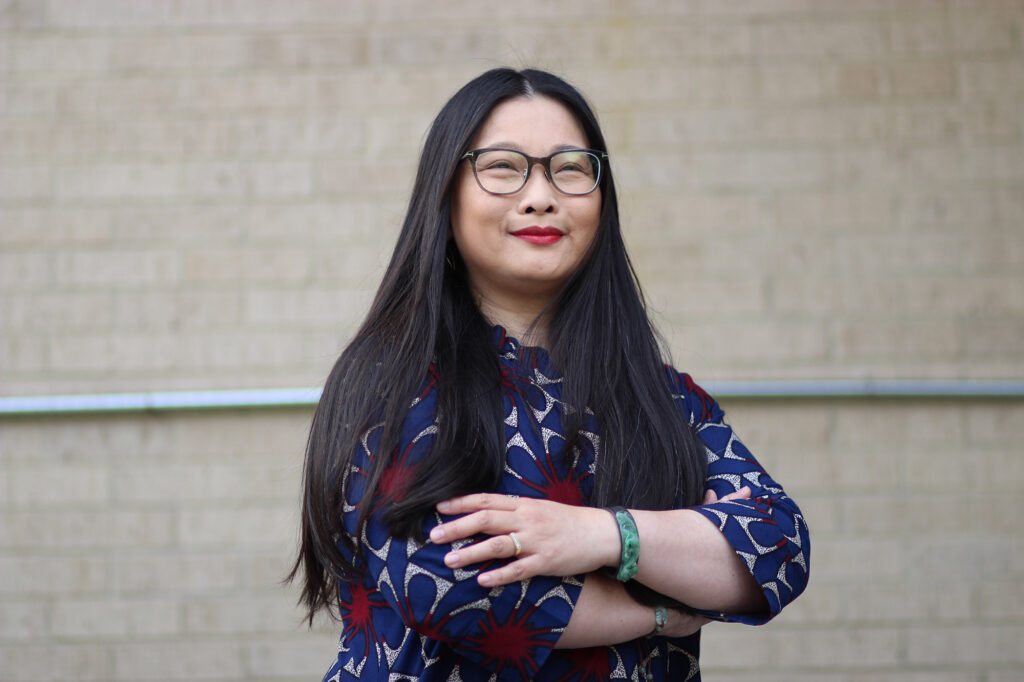
Born in Taiwan, Jin-Ya is the descendent of refugees who fled China in search of a safe and peaceful life. At the age of 13, Jin-Ya and her family were invited to come to the United States to help Jin-Ya’s uncle open a restaurant franchise of 16 locations. Due to extreme economic hardships, Jin-Ya’s parents agreed and made their way from Taipei, Taiwan all the way to Tulsa, Oklahoma to join the family business. Soon enough, Jin-Ya’s parents had enough to purchase their own restaurant in Dallas, where Jin-Ya saw first-hand how her mother, Margaret Mei Huang, lived her life following three golden rules:
These principles might resonate with many who desire to live meaningful lives, but for Jin-Ya, they are the bedrock for an unexpected journey that has led her to the national spotlight.
Jin-Ya witnessed the impact of these principles in the kitchen of the family restaurant, where Margaret regularly employed and mentored immigrants and refugees before sending them on to bigger and better opportunities.
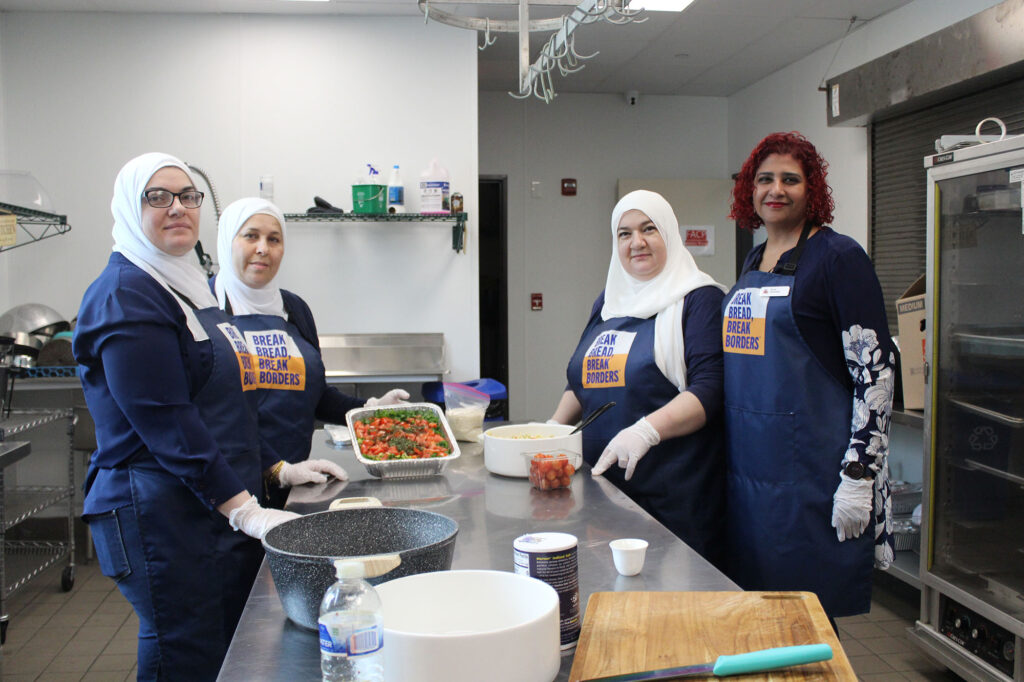
“My mom was a chef, and she was very much a community leader,” Jin-Ya says. She shares that Margaret understood how tough it is to be displaced by war, famine, and poverty, and she just wanted to do her part.
When Margaret passed away from cancer in 2015, Jin-Ya sought after a means to process her grief and honor the legacy of her mother. In the spirit of community and healing through art, Jin-Ya, in collaboration with local refugee resettlement agencies, hosted a gathering where the community could share a meal and have conversations about refugees, immigrants, and the many difficulties they face.
The attendees loved it. The food, the stories– everyone wanted Jin-Ya and her team to come do a pop-up dinner at their home or work function. As Jin-Ya listened to what other refugees had to say in response to the community dinner, however, it became clear to her that what was truly needed to help these individuals was jobs. From that night, Break Bread, Break Borders was officially born.
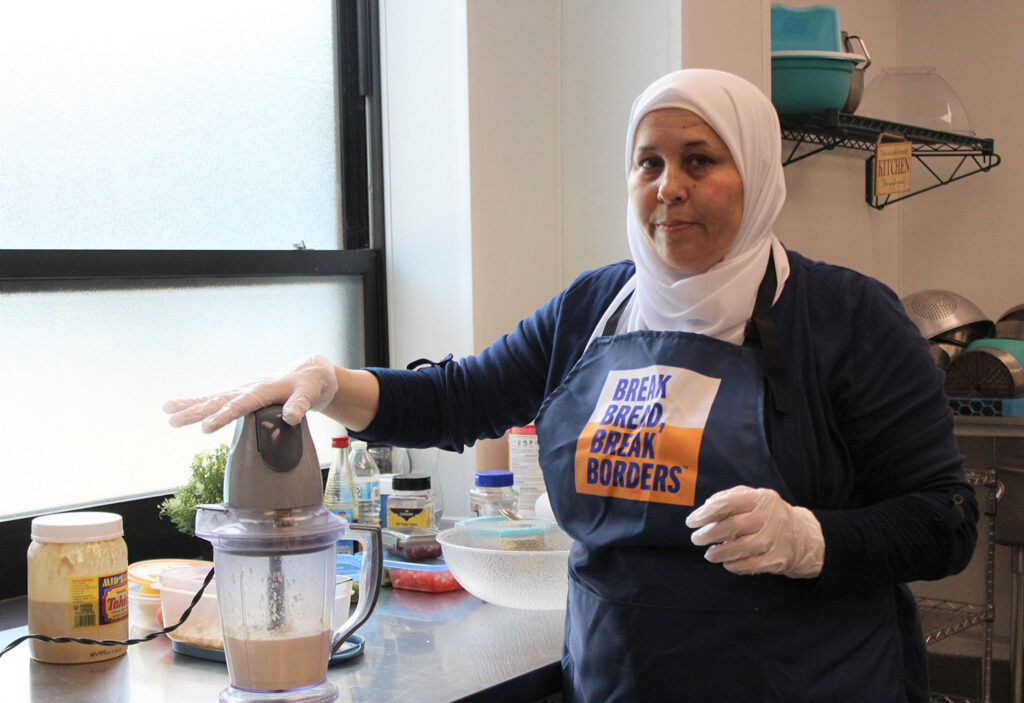
“My parents, aunt, and uncle were entrepreneurs,” Jin-Ya says. “I thought, ‘Oh how hard could it be to start a business?’”
It turns out, it can be very hard. It took two years from the time Jin-Ya’s mother passed away for Jin-Ya to find community members and groups interested in experiencing the food and stories of refugees and other displaced people.
“I had been pitching the idea for two years,” Jin-Ya says, “but because it was about refugees and immigrants no one would touch it.” Jin-Ya believes that there is an all too-common misunderstanding about refugees and other displaced groups that causes divides among the DFW community. According to her, it took the travel ban in 2017 for the community to realize that there was a problem and to stand in solidarity with refugees and immigrants.
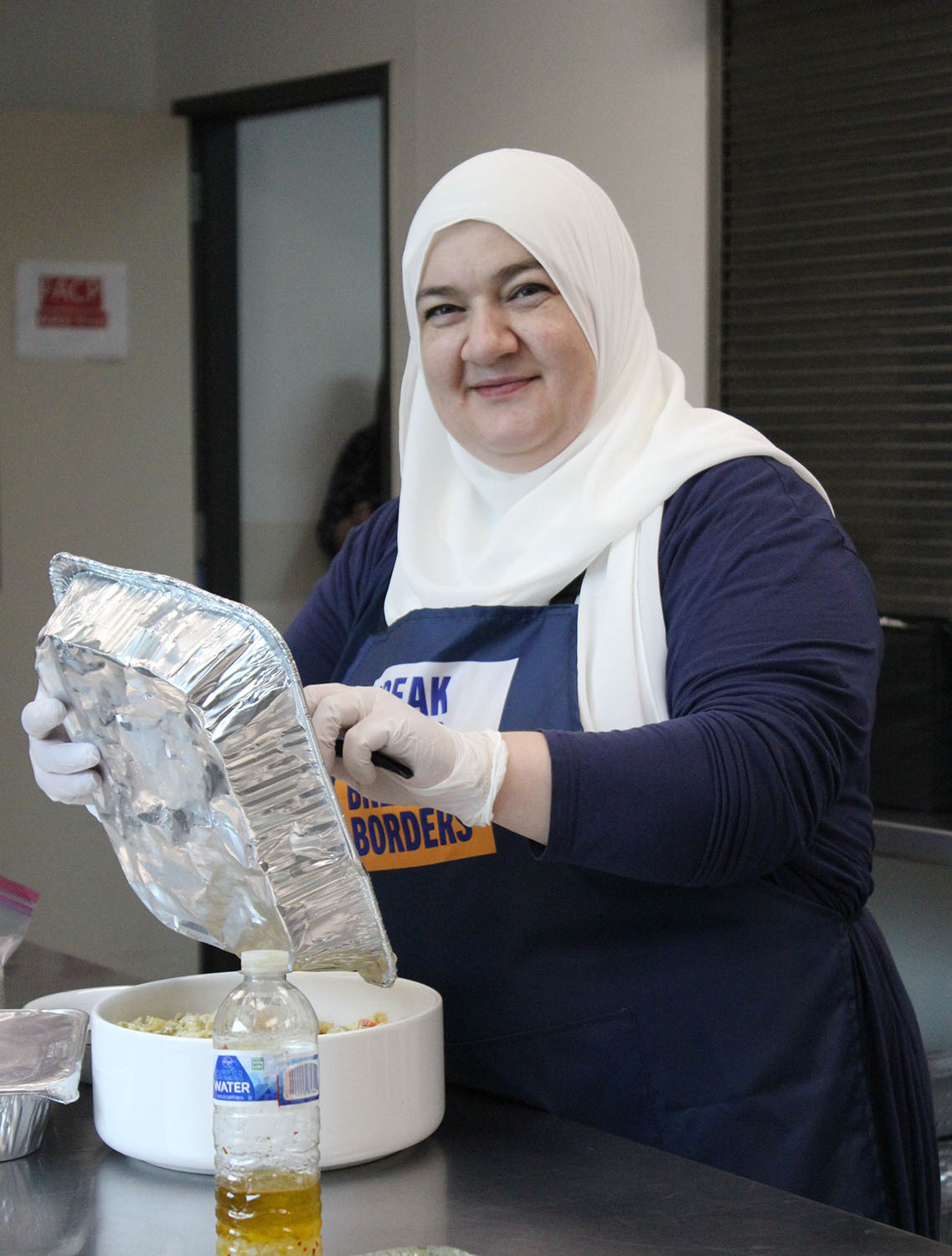
At the heart of Break Bread, Bread Borders are refugee women like N., C., and S. (full names removed for safety) who work seamlessly in unison to create a flavorful and impactful experience with each event they cater.
“I enjoy working (at BBBB),” C. says. “I enjoy going to the events and telling our story. I like to see the reactions of the people. Before we came here (to the United States), we were afraid if people would want to accept us or not. We’re a different culture and different religion.”
To C.’s surprise, however, life in the United States has been a relief. “We were in a tough situation before we came here, so when I came here everything was absolutely gorgeous. I have no complaints at all.”
The women who come to work at BBBB do so with various backgrounds, some having been teachers, others homemakers, but they all fled the only home they knew, bringing with them few earthly possessions in hopes of finding safety and freedom for their families. Many of the women at BBBB were unable to work or send their children to school in their home countries, and so life in America has given them a future they never thought possible. As with anything new, there have been learning curves such as learning a new language, understanding the explicit and implicit cultural norms of a new country, and even in the types of food readily available.
With a multitude of obstacles in front of refugees coming to America, Jin-Ya wanted working at BBBB to be accessible for any woman who wanted a job. Many of the women hear of Jin-Ya through the refugee community and seek out employment directly. Once the connection is made, Jin-Ya engages in conversation about their cooking experience and the types of food each woman enjoys making, culminating with a taste test of a dish made by the hopeful community cook.
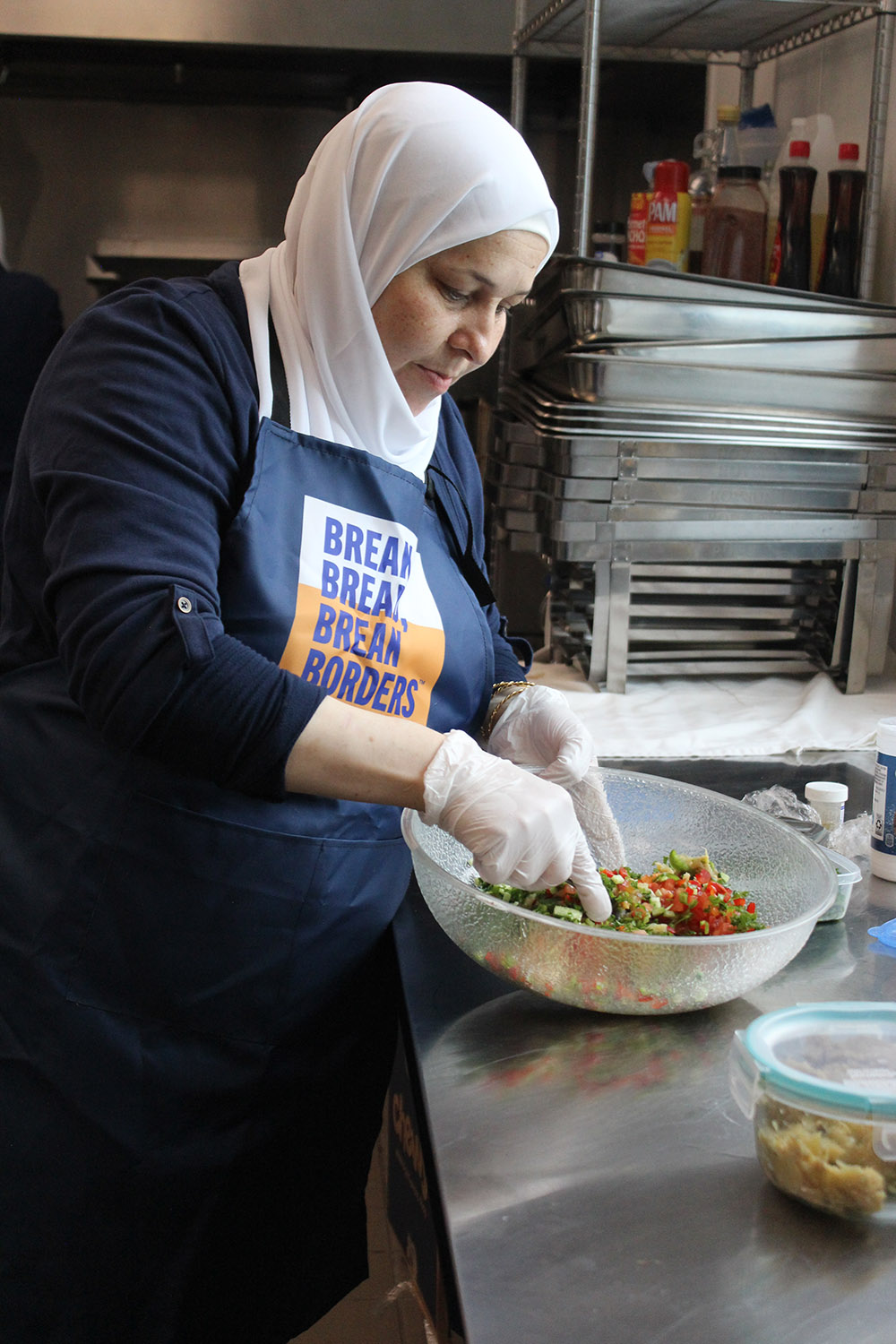 “It’s a very accessible job interview without the long drawn out paperwork. It’s leveraging their existing job skills. Oftentimes, wherever they have come from, even if they’ve never worked a day professionally in their life, they’ve stepped foot in a kitchen.” Once hired, Jin-Ya expects the new community cook to help coordinate menus, cook the food, and participate in the events as each person is willing.
Honing their cooking skills is not the only thing gained working at BBBB though. Described as a workforce development training program, Jin-Ya has developed a two-year program with BBBB where women obtain food handler permits and other certifications, gain English experience, learn to share their stories in public, and receive mentorship from other successful women of color in the culinary and art spaces.
More than that, the women who come to work at BBBB gain a community of women dedicated to each other’s success. With flexible schedules to accommodate working mothers, many of the cooks at BBBB have the ability to cook as their schedule allows while traveling across the metroplex meeting new people from around the world.
Food is a universal language; it is the great equalizer. Jin-Ya believes that regardless of what differences or challenges you have. She says you can always sit down and share a plate of food with powerful storytelling and really come to understand someone else.
“It’s a very accessible job interview without the long drawn out paperwork. It’s leveraging their existing job skills. Oftentimes, wherever they have come from, even if they’ve never worked a day professionally in their life, they’ve stepped foot in a kitchen.” Once hired, Jin-Ya expects the new community cook to help coordinate menus, cook the food, and participate in the events as each person is willing.
Honing their cooking skills is not the only thing gained working at BBBB though. Described as a workforce development training program, Jin-Ya has developed a two-year program with BBBB where women obtain food handler permits and other certifications, gain English experience, learn to share their stories in public, and receive mentorship from other successful women of color in the culinary and art spaces.
More than that, the women who come to work at BBBB gain a community of women dedicated to each other’s success. With flexible schedules to accommodate working mothers, many of the cooks at BBBB have the ability to cook as their schedule allows while traveling across the metroplex meeting new people from around the world.
Food is a universal language; it is the great equalizer. Jin-Ya believes that regardless of what differences or challenges you have. She says you can always sit down and share a plate of food with powerful storytelling and really come to understand someone else. 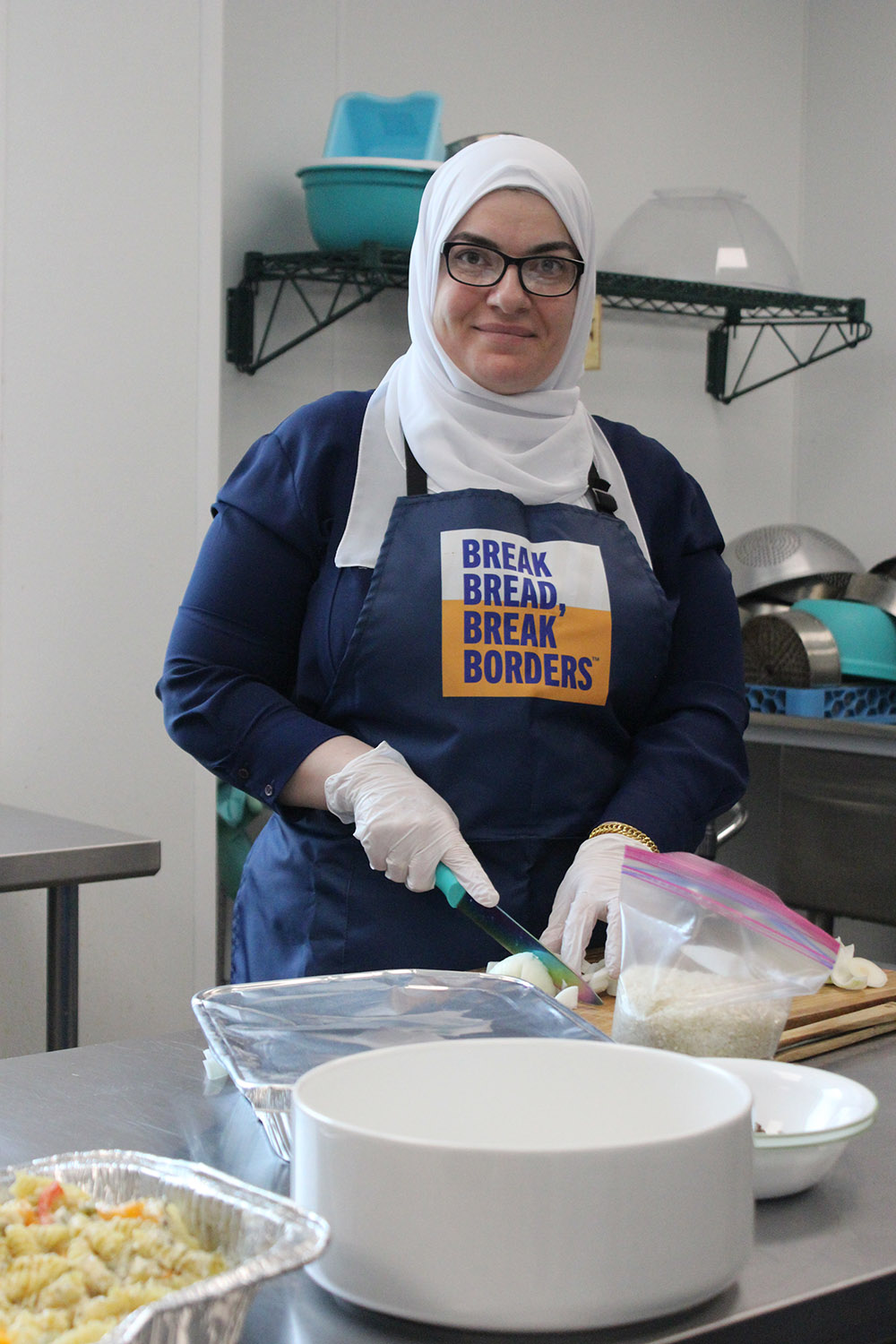
“We’re really grateful when we have these conversations with the communities, because the ladies don’t just drop off the food, they actually do storytelling,” Jin-Ya explains. “Instead of hiding in the kitchen or being invisible as servers, they get up on stage in front of the audience and actually share their story of who they were before they escaped from war torn countries, what it’s like to live with as refugees abroad, what it’s like coming to America, and also what it’s like to cook with BBBB. We love to tell our story because we want people to understand it’s not easy for anyone to start over in a different country.”
When asked if there was anything the women would want their community to know, the common theme was loving your neighbor and practicing compassion daily. “We all look for love. We all look for safety,” C. says, “and we all look for freedom. It’s the American dream.”
“Please do good to each other,” S. says, “we all need good people around us who accept us.”
In the future, Jin-Ya hopes that people will get involved with BBBB by hiring them for their next event. “Taste the food and you will understand,” she says.
Jin-Ya also plans to scale BBBB. It will most likely expand to Houston, then Austin, because of the larger refugee population and potential community partners. Beyond that, she is also looking to expand into the prepared food space, and welcomes leads from the community in getting into local grocery stores.
Other areas of community involvement include mentorship of the women. Jin-Ya encourages the DFW community to be a friend to the community cooks at BBBB–help them learn the cultural nuances of America and help the women practice their English. Donations and sponsorships are also welcomed to support the company and, more importantly, the education, training, and empowerment for the staff of BBBB.
Break Bread, Break Borders is much more than a catering company. It is a platform for the newest members of the community to lift their voice and have a safe platform to share their stories, triumphs and pains in order to foster understanding and community. Because when people come to the table together and break bread, what they really do is break borders that divide.
“My mom worked really hard to make this world a better place for me to grow up,” Jin-Ya says, “and that’s what we have to do for others.”
*A refugee is “someone who is unable or unwilling to return to their country of origin owing to a well-founded fear of being persecuted for reasons of race, religion, nationality, membership of a particular social group, or political opinion.” – recognized definition from the UNHCR 1951 Convention
Sign up with your email address to receive good stories, events, and volunteer opportunities in your inbox.